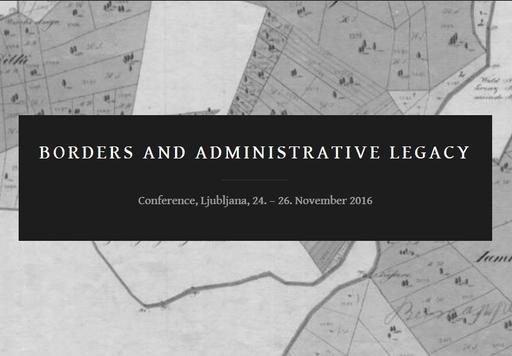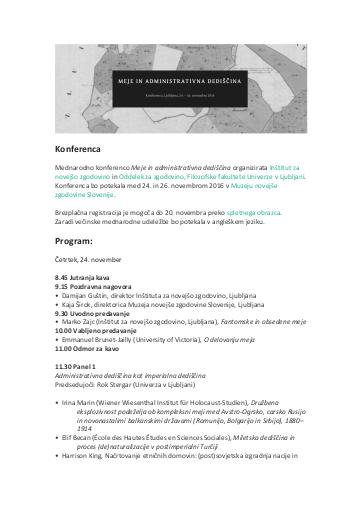/
Dogodki
/
Konference
Borders and Administrative Legacy
Ljubljana, 24. – 26.11.2016

Soavtor(ji):Marko Zajc, Jernej Kosi, Zdenko Čepič, Neja Blaj Hribar
Leto:2016
Založnik(i):Inštitut za novejšo zgodovino, Ljubljana, Oddelek za zgodovino Filozofske fakultete Univerze v Ljubljani
Jezik(i):angleščina
Vrst(e) gradiva:video
Posamezni prispevki:
- Discussion 8
- Nataša Sardžoska, From Dissolving Borders towards Liminal Boundaries: Ontological Uncertainty in the Border-Art-Work of Expatriated former-Yugoslavian Artists
- Jasper Klomp, Administrative Legacy and the Politics of Memory in the Third Polish Republic: The Case of the Oder-Neisse Line
- Discussion 7
- Petar Bagarić, Phantom Borders in Croatia: The Case Study of the Primorje-Gorski Kotar County
- Alexandru Lesanu, Transnistrian (Il)licit Flows: How an Unrecognized State Copes with the Global Economy
- Scott Moore, An Emperor by a Different Name: Patriotic Celebrations in Imperial and Republican Austria
- Discussion 6
- Vanni D’Alessio, Names, Legacies, Borders and Representations of Rijeka and the Upper Adriatic
- Matjaž Geršič, Rivers as Borders in People’s Consciousness
- Discussion 5
- Ramya Swayamprakash, Drawing a Line on Water: The Administrative Legacy of the Detroit River Border
- Mateja Breg Valjavec / Rok Ciglič / Matija Zorn, Changing River Courses as Natural Geographical Delimiting Factors in Administrative Demarcation
- Drago Kladnik / Matija Zorn, Border Rivers as a Global Feature
- Magnus Halsnes, Consequences and legacies of the desert borders of Jordan, 1921–1965
- Diskusija 4
- Shay Rozen, Israeli-Syrian border – the Baha’i’s aspect
- Lili Zách, The significance of Central European border settlements in the work of the North-Eastern Boundary Bureau and the Boundary Commission in Ireland before 1925
- Catherine Gibson, Mapping the ‘Phantom Borders’ of the Northern Polish-Lithuanian Commonwealth, 1914-1920
- Bernhard Struck, Travels in Lotharingia OR What if…Napoleon had spoken Esperanto? A spatial, long-term analysis of the inner Empire and its legacies (including: zinc, code, and a small (very small) territory)
- Ekaterina Mizrokhi, Securitizing Berlin: The Legacy of the Iron Curtain
- Discussion 3
- Aleš Gabrič, Border Changing Between Slovenia and Croatia near Gradin in post-WWII period
- Stipica Grgić, Accepting the Border, Choosing the Border: Štrigova and Razkrižje Microregion 1910-1953
- Filip Čuček, Regulation of the Styrian-Croatian border on the river Drava in the 18th and early 19th Century
- Machteld Venken, Presentation of the edited volume Borderland Studies Meets Child Studies A European Encounter (Frankfurt am M., Peter Lang Verlag, 2017)
- Discussion 2
- Bojana D. Savić, Who is Willing to Compromise? Muslims, Serbs and the Frontier in the Nineteenth Century Ottoman Empire
- Hrvoje Čapo, Mapping the legacy: tracing the Croatian Military Frontier through criminal behaviour data, 1900-1910
- Harrison King, Engineering Ethnic Homelands: (Post-) Soviet Nation-Building and the Afterlives of Bolshevik Borders in the South Caucasus
- Discussion 1
- Irina Marin, Rural Social Combustibility along the Complex Frontier between Austria-Hungary, Tsarist Russia and the Fledgling Balkan States (Romania, Bulgaria, Serbia) – 1880-1914
- Emmanuel Brunet-Jailly, About the Agency of Borders
- Marko Zajc, Phantom and Possessed borders
- Damijan Guštin / Kaja Širok, Opening remarks
Datoteke (1)

Ime:Konferenca Meje.pdf
Velikost:1.65MB
Format:application/pdf
Stalna povezava:https://hdl.handle.net/11686/file22586
Opis
What is administrative legacy? Borders are not merely lines on maps and markers in the field: they are “virtual spaces” with a horizontal and vertical dimension. We can envision borders as historical/social phenomena, with their own height, width, length (and weight). The horizontal encompasses the social influence of the borders, while the vertical includes the historical layers. The layers recorded in the official bureaucratic sources may also be referred to as administrative legacy. As far as phantom borders are concerned, the past, structured in the present, is essential. At the same time, administrative legacy is the phantom past, structured in the official records of the states and, as such, literally represents the old in the new. It is pure history in the sense of what has been preserved and recorded, something that never dies, but also never remains the same. Each time it comes to life it acquires a different form and has a different effect. Administrative legacy is vital for the legitimacy and status of the present. The legitimacy and meaning of the contemporary borders stem merely from the official records. Phantom and actual political borders may overlap. Borders can outlive the states that created them. It is obvious that when the constellation of the political spaces changes or when new spaces are being created, a crack may open and the phantom past may ooze out, possessing the border. As the political space changes, the parts of the administrative legacy that had been technical, even obscure, suddenly become important: cadastral municipality borders, police districts, fishing zones, landscape parks, etc. The purpose of this conference is to critically assess the methodological and conceptual power of the administrative legacy and to subject it to theoretical and empirical historical research.
Metapodatki (10)
- identifikatorhttps://hdl.handle.net/11686/37178
- naslov
- Borders and Administrative Legacy
- Ljubljana, 24. – 26.11.2016
- Meje in administrativna dediščina
- Ljubljana, 24. – 26.11.2016
- soavtor
- Marko Zajc
- Jernej Kosi
- Zdenko Čepič
- Neja Blaj Hribar
- opis
- What is administrative legacy? Borders are not merely lines on maps and markers in the field: they are “virtual spaces” with a horizontal and vertical dimension. We can envision borders as historical/social phenomena, with their own height, width, length (and weight). The horizontal encompasses the social influence of the borders, while the vertical includes the historical layers. The layers recorded in the official bureaucratic sources may also be referred to as administrative legacy. As far as phantom borders are concerned, the past, structured in the present, is essential. At the same time, administrative legacy is the phantom past, structured in the official records of the states and, as such, literally represents the old in the new. It is pure history in the sense of what has been preserved and recorded, something that never dies, but also never remains the same. Each time it comes to life it acquires a different form and has a different effect. Administrative legacy is vital for the legitimacy and status of the present. The legitimacy and meaning of the contemporary borders stem merely from the official records. Phantom and actual political borders may overlap. Borders can outlive the states that created them. It is obvious that when the constellation of the political spaces changes or when new spaces are being created, a crack may open and the phantom past may ooze out, possessing the border. As the political space changes, the parts of the administrative legacy that had been technical, even obscure, suddenly become important: cadastral municipality borders, police districts, fishing zones, landscape parks, etc. The purpose of this conference is to critically assess the methodological and conceptual power of the administrative legacy and to subject it to theoretical and empirical historical research.
- založnik
- Inštitut za novejšo zgodovino
- Oddelek za zgodovino Filozofske fakultete Univerze v Ljubljani
- datum
- 2016
- 24. 11. 2016 - 24. 11. 2016
- tip
- video
- jezik
- Angleščina
- imaDel
- https://hdl.handle.net/11686/37266
- https://hdl.handle.net/11686/37265
- https://hdl.handle.net/11686/37264
- https://hdl.handle.net/11686/37263
- https://hdl.handle.net/11686/37262
- https://hdl.handle.net/11686/37261
- https://hdl.handle.net/11686/37260
- https://hdl.handle.net/11686/37259
- https://hdl.handle.net/11686/37258
- https://hdl.handle.net/11686/37257
- https://hdl.handle.net/11686/37256
- https://hdl.handle.net/11686/37255
- https://hdl.handle.net/11686/37254
- https://hdl.handle.net/11686/37253
- https://hdl.handle.net/11686/37252
- https://hdl.handle.net/11686/37251
- https://hdl.handle.net/11686/37250
- https://hdl.handle.net/11686/37249
- https://hdl.handle.net/11686/37248
- https://hdl.handle.net/11686/37247
- https://hdl.handle.net/11686/37246
- https://hdl.handle.net/11686/37245
- https://hdl.handle.net/11686/37244
- https://hdl.handle.net/11686/37243
- https://hdl.handle.net/11686/37242
- https://hdl.handle.net/11686/37241
- https://hdl.handle.net/11686/37240
- https://hdl.handle.net/11686/37239
- https://hdl.handle.net/11686/37238
- https://hdl.handle.net/11686/37237
- https://hdl.handle.net/11686/37236
- https://hdl.handle.net/11686/37235
- https://hdl.handle.net/11686/37234
- https://hdl.handle.net/11686/37233
- https://hdl.handle.net/11686/37232
- datotečni vir
